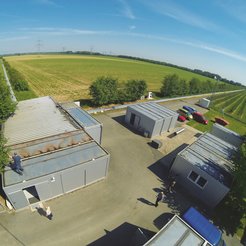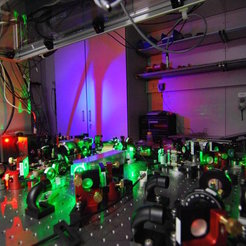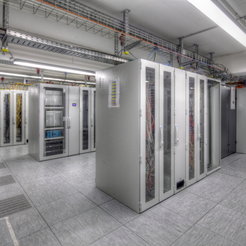Gravitational waves | Quantum optics | Computers
CANCELLED: DPG meeting in Hannover: Tours at the Max Planck Institute for Gravitational Physics
The MPI for Gravitational Physics cooperates very closely with the Institute for Gravitational Physics at Leibniz Universität Hannover. Both institutes play a leading role in the development of gravitational-wave astronomy on Earth and in space. As part of the programme of the DPG meeting, research facilities at the institutes can be visited.
Update (March 4) The DPG Meeting in Hannover has been cancelled. Therefore none of the tours described below will take place.
Gravitational-wave detector GEO600

A free bus transfer takes you to the GEO600 site about 20 km south of Hannover, where you will visit the detector site and the experiments there in a guided tour. Technologies developed in this think tank of gravitational-wave research are now used in all large gravitational-wave observatories. More at geo600.org.
Meeting point: In front of the main building of the University
Tour starts: Wednesday, March 11, 13:00 CET; Back by bus: 16:00 CET (main building of the University)
Room for: 40 participants, Registration in the conference office required.
Labs of the research group “Quantum Control”

Guided tour of laboratories of the research group “Quantum Control” for students. The group’s main research interests are coherent quantum noise cancellation and non-classical light (“squeezed”) light at high frequencies for, e.g., precision metrology. More at quantumcontrol.aei.uni-hannover.de.
Meeting point: Conference office (room C109, main building of the University)
Tour starts: Tuesday, March 10, and Thursday, March 12, at 13:15 CET; Tour ends: 14:00 CET (at the MPI)
Room for: 6 students each tour, Registration in the conference office required.
Atlas computer cluster

This tour offers insights behind the scenes of the high-throughput computing cluster Atlas at the Max Planck Institute for Gravitational Physics in Hannover. With about 100,000 CPU cores in 3,700 computing nodes, Atlas is the world’s most powerful cluster for gravitational-wave data analysis. More at aei.mpg.de/atlas-cluster.
Meeting point: Conference office (room C109, main building of the University)
Tour starts: Tuesday, March 10, and Thursday, March 12, at 13:15 CET; Tour ends: 14:00 CET (at the MPI)
Room for: 15 participants each tour, Registration in the conference office required.
10-meter interferometer prototype

Visit the 10-meter interferometer prototype, a test bed for new technologies to be used in future interferometric gravitational-wave detectors. The prototype provides a low-noise environment in an ultra-high vacuum with comprehensive environmental sensing and digital control infrastructure. More at aei.mpg.de/10-meter-prototype.
Meeting point: Conference office (room C109, main building of the University)
Tour starts: Tuesday, March 10, and Thursday, March 12, at 13:15 CET; Tour ends: 14:10 CET (at the MPI)
Room for: 8 participants each tour, Registration in the conference office required.















